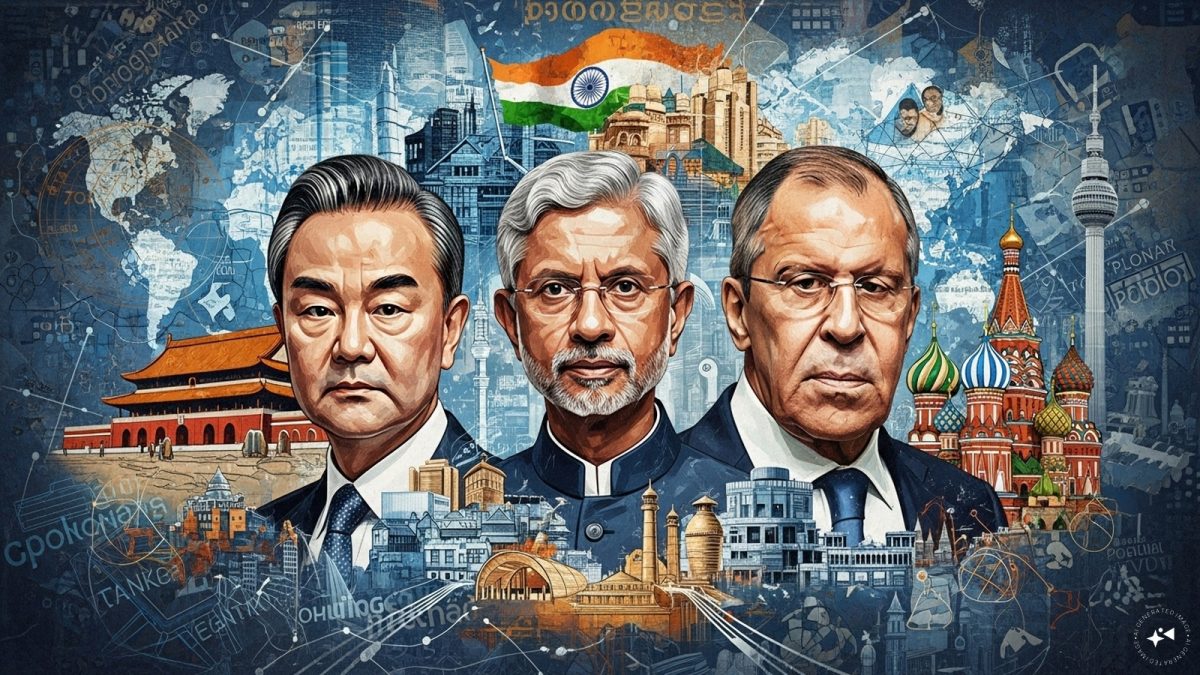India stands today at a pivotal crossroads in its foreign policy. As tensions simmer on multiple fronts, from the western borders with Pakistan to the Himalayan standoff with China, and now with trade uncertainty with the US—New Delhi is recalibrating its diplomatic outreach. External Affairs Minister S Jaishankar’s visit to Moscow and the arrival of Chinese Foreign Minister Wang Yi in New Delhi are not just routine diplomatic exchanges; they are strategic manoeuvres in a complex geopolitical chess game.
The backdrop is telling. The US, once touted as India’s most promising strategic partner in the 21st century, has recently imposed high tariffs on Indian goods. This move, paired with Washington’s growing unpredictability under President Donald Trump’s “America First” economic nationalism, has sent a clear message that India cannot afford to put all its eggs in the US basket. For a country that aspires to be Vishwaguru and Atmanirbhar, diversifying its international engagements is no longer a matter of choice but of necessity.
Jaishankar’s Moscow visit (August 19-21) to meet his counterpart Sergey Lavrov is part of the preparatory consultations for the Russia-India annual summit, which President Vladimir Putin is expected to attend later this year. The Indo-Russian friendship is no stranger to turbulence, but it remains deeply rooted in decades of trust, particularly in defence, nuclear energy, and strategic coordination. This visit gains significance in light of recent high-level contacts.
National Security Adviser Ajit Doval was in Moscow days earlier, meeting Defence Minister Sergey Shoigu. Prime Minister Narendra Modi himself spoke to Putin over the phone, signalling a steady, deliberate strengthening of ties. Unlike the transactional approach of the US, Russia’s strategic partnership with India is one of mutual reliability. It is Moscow that has stood by New Delhi at the UN Security Council during the darkest hours, whether during the 1971 war or in the aftermath of the Balakot strikes.
Impact Shorts
More ShortsYet, this relationship is not without its strategic pressures. Russia’s growing closeness to China, driven largely by Western sanctions, complicates the calculus. But India’s approach is pragmatic: engage Moscow deeply enough to ensure that Russia does not tilt entirely into Beijing’s orbit. If the Moscow leg is about deepening bonds with an old friend, the visit of Wang Yi to New Delhi is about managing a complicated, often tense, neighbour.
The India-China dynamic is unlike any other. Only three months ago, India had a limited conflict with Pakistan under Operation Sindoor, during which Chinese military inputs reportedly reached Islamabad. The shadow of the unresolved border dispute looms large.
Beijing’s strategy is clear: maintain economic engagement while keeping military pressure alive on the Line of Actual Control (LAC). Wang Yi’s visit sees discussions on the stalled border talks. Beyond breakthroughs, New Delhi’s hosting the Chinese Foreign Minister sends an important message: India is ready to talk, but it will not compromise on sovereignty. The timing of Wang’s visit is also noteworthy. It comes ahead of Prime Minister Modi’s expected visit to China for the Shanghai Cooperation Organisation summit in Tianjin. That New Delhi is engaging China at the foreign minister level before such a high-profile meeting shows a calculated approach to set the tone, draw the red lines, and explore potential trade-offs.
One cannot discuss India-China relations without factoring in Pakistan. China’s deep strategic embrace of Pakistan, from the China-Pakistan Economic Corridor (Cpec) to military assistance, remains a sore point for India. Lt General Rahul R Singh’s statement in July that China provided “live inputs” to Pakistan during the conflict serves as a stark reminder of the challenges New Delhi faces. Every handshake with Beijing carries the weight of this reality. For China, Pakistan is a convenient proxy to keep India strategically distracted. For India, this necessitates a twin approach: strengthening border preparedness while keeping diplomatic channels open to avoid miscalculations that could escalate into conflict.
The larger strategic picture here is one of balancing three major powers—the US, Russia, and China—each of which has its competing interests. The US offers technology, investment, and a counterweight to China in the Indo-Pacific, but it also wields economic pressure through tariffs. Russia offers defence cooperation and energy security but is deepening ties with Beijing. China offers trade opportunities but continues to challenge India’s territorial integrity and security environment.
In this three-way balancing act, India is playing the long game. The Modi government has demonstrated that it will engage all sides without being beholden to any. This is the essence of strategic autonomy, a principle rooted in India’s post-independence foreign policy but now adapted for the multipolar world order. The immediate takeaway from these back-to-back engagements is that India is not retreating into a defensive posture despite challenges on multiple fronts. Instead, it is doubling down on high-level diplomacy. Jaishankar in Moscow, Wang Yi in New Delhi, and Modi in Tianjin – these are not isolated events but part of a coordinated push to safeguard India’s interests.
For the Indian right, which views foreign policy through the lens of civilisational resurgence, this approach aligns well with the vision of a strong, self-reliant Bharat that commands respect on the world stage. The message is clear: India will engage, but on its terms; it will negotiate, but from a position of strength. The US tariffs may have triggered this latest flurry of activity, but the deeper motivation is strategic. In an era where alliances are fluid and power is increasingly multipolar, India’s ability to balance, hedge, and assert will determine not just its economic prosperity but its civilisational destiny.
Each handshake, each discussion, will carry the weight of history and the promise of a Bharat that stands tall, unbowed, and ready for the challenges of the 21st century.
The writer is a technocrat, political analyst, and author. He pens national, geopolitical, and social issues. His social media handle is @prosenjitnth. Views expressed in the above piece are personal and solely those of the author. They do not necessarily reflect Firstpost’s views.


)

)
)
)
)
)
)
)
)



